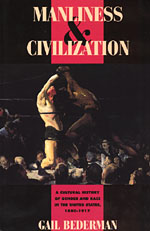
Manliness and Civilization: A Cultural History of Gender and Race in the United States, 1880-1917 (1995)
By Gail Bederman
Synopsis: This book seeks to illuminate the ways in which "middle-class men and women worked to re-define manhood in terms of racial dominance, especially in terms of 'civilization'" (20). Focuses the bulk of the book on four different figures: Ida B. Wells (discussed race problem and lynching as "unmanly" and an act of barbarism, yet whites continued to link lynching with manliness); G. Stanley Hall (believed in "recapitulation" theory that each human lived entire evolutionary sequence, and that kids were going through "primitive/savage" stage, and this should be encouraged so they don't turn out as weak, overcivilized pansies); Charlotte Perkins Gillman (linked feminism to white supremacy of civilization); Theodore Roosevelt (obsessive view that white race was the manliest and most powerful, and that it would remain manly via the strenuous life and via imperialist expansion into Cuba, Philippines, and Puerto Rico; and that middle class whites must prevent "race suicide" by having more kids). Argues that race and gender are intricately linked, and that "gender - whether manhood or womanhood - is a historical, ideological process...[it's a] continual, dynamic process" (7). Because definitions of manliness are always shifting, we shouldn't see 1870-1910 as a time of "crisis" per se, but rather as another redefinition. The rise of leisure and the decline of self-employed men led to changing notions of "masculinity," and increased fears that the "feminine" Victorian era would emasculate men. Men basically felt that they were losing control. However, the rhetoric of "civilization" and "manliness" was so flexible that it could be used in an array of ways - often contradictory ways. At its core, "civilization" discourse was all about race, gender, and power. 1910 Jack Johnson (black)/Jim Jeffries (white) "fight of the century" all about "reclaiming" white male dominance (though Johnson won).
Interacts With:
Hope in a Jar, Houdini, Tarzan, and the Perfect Man, Terrible Honesty (with idea that certain eras can be "feminine" or "masculine" - "masculine" modernity as a reaction against "feminine" Victorian era), All the World's A Fair (for discussion of white male superiority and racial dominance)

No comments:
Post a Comment